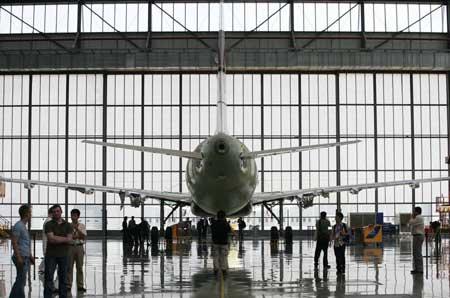
The Airbus A320 final assembly plant in Tianjin. The factory, Airbus' first aircraft final assembly line outside Europe, delivered its first A320 to Sichuan Airlines one year ago. Bao Fan / for China Daily
European plane maker eyes collaboration in aircraft financing, air traffic management and maintenanceBEIJING - European aircraft manufacturer Airbus is mulling new initiatives, including potential joint ventures, in China to expand its presence outside industrial areas in the world's fastest growing aviation market, a top company executive said.
The Toulouse, France-based airplane producer is looking at several opportunities in areas including aircraft financing and leasing, air traffic management and navigation procedures, aircraft maintenance, repair and overhaul (MRO), and onboard wireless communications connectivity, said Laurence Barron, Airbus China president.
"In the past we concentrated on industrial projects. But we are now looking at a much wider area to develop our presence and increase our footprint in China," Barron said."In the short term, we probably can move forward on one or two additional cooperation projects outside the traditional industrial areas."
Barron said all these areas present huge market potential for Airbus, while he declined to release further details on potential projects.
China's ambitious plan to build 97 new airports by 2020, while expanding existing ones, to bring the total number of airports to 244, will provide great market potential for air traffic management systems and the development of modern navigation procedures, Barron said.
Moreover, Chinese financial service companies have emerged into a rising star in the global aircraft financing market as liquidity in the US and Europe was reduced during the global economic crisis.
Airbus' archrival Boeing set up a maintenance, repair and overhaul joint venture in Shanghai in 2006. Boeing holds a 60-percent-stake in the company, while Shanghai Airport Authority and Shanghai Airlines hold 25 and 15 percent stakes respectively.
China is becoming the fastest growing maintenance, repair and overhaul market in Asia due to Chinese airlines' fleet expansion and US and European carriers' increasing tendency to outsource aircraft maintenance services to low-cost providers.
Since delivering its first aircraft to China in 1985, Airbus has built four joint ventures in the country, including the A320 final assembly line in Tianjin, a composite material manufacturing center in Harbin, Heilongjiang province, an engineering center in Beijing that designs parts for the A350 aircraft, and a pilot and engineer training center in Beijing.
The factory in Tianjin, Airbus' first aircraft final assembly line outside Europe, delivered its first A320 to Sichuan Airlines one year ago. So far it has delivered 22 airplanes to seven Chinese airlines. It will ramp up production to four jets a month in 2012.
The final assembly line is 51 percent owned by Airbus, with the remainder held by a Chinese consortium comprised of the Tianjin Free Trade Zone and the China Aviation Industry Corp.
Barron said the European debt crisis would have a limited impact on China's aviation industry as the Chinese market is largely driven by domestic demand.
"I am more optimistic about China than one year ago when everybody was worried about the global economic crisis," Barron said.
China's domestic air passenger traffic surged 22 percent last year despite the global economic downturn and grew 18.8 percent in the first four months of this year, according to figures from the Civil Aviation Administration of China. International passenger traffic has also rebounded and grew 29.9 percent between January and April.
The International Air Transport Association recently said it expects airlines to post a global profit of $2.5 billion in 2010 due to a strong traffic rebound after losing $9.4 billion last year. Asia-Pacific carriers will deliver the largest profit - $2.2 billion - due to strong GDP growth expectations, said Giovanni Bisignani, IATA's director-general and CEO.
Boeing last week announced a second production rate increase on the B737 program, taking the rate from the previously announced 34 airplanes per month to 35 in early 2012. In May, Boeing cited continued strong demand for the B737 as a reason to ramp up production from 31.5 to 34 jets per month.
Airbus said in March that it will increase the monthly production rate for the A320 from 34 to 36, starting in December this year.





